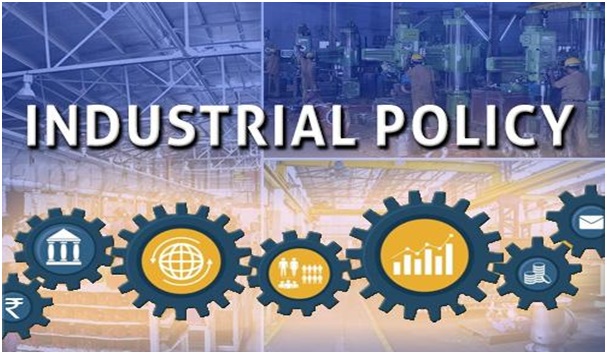Why India Needs an Industrial Policy? (Indian Express)

- 11 Aug 2023
Why in the News?
- India's move to impose import limitations on personal computers, laptops, and a variety of commodities has sparked a discussion about the trajectory of the nation's industrial policy.
- Detractors view these restrictions as reminiscent of a bygone era when the Indian economy was constrained by the license permit regime.
The Government's Directive Regarding Laptop Import Ban:
- On August 3rd, the Union Government introduced measures to restrict the import of laptops, tablets, all-in-one personal computers, ultra-small computers, and servers, effective immediately.
- Entities or businesses intending to import laptops and computers for sale within India will now require government permission or a license for their importation.
- This directive was issued by the Directorate General of Foreign Trade (DGFT).
- The restrictions have been enacted under HSN Code 8471, affecting seven categories of electronic devices.
- The Harmonized System of Nomenclature (HSN) code is an organizational system utilized for tax-related product identification.
- HSN Code 8471 is employed to categorize devices specifically designed for data processing functions.
- However, due to issues arising at ports where customs officials were detaining shipments of the specified electronic goods, the DGFT opted to suspend the enforcement of this measure until November 1st, 2023."
Concerns Regarding the Laptop Import Restrictions:
- These limitations have raised concerns about a potential regression of the Indian economy into the period characterized by the license permit system, during which discretionary and authoritarian bureaucratic control prevailed, sometimes accompanied by corruption.
- During that era, citizens encountered scarcities, substandard products, or attempts to circumvent government regulations.
- The manner in which the government introduced the import ban on laptops, subsequently revising the deadlines, has evoked familiar concerns about bureaucrats who seem to "act first and inquire later."
- Nonetheless, proponents of the policy contend that its implementation was long overdue.
How these Restrictions are Different from Regulations in the 1960s-70s?
- Shift in Circumstances
- Indian industrial policy of the past yielded moderate outcomes, However, the historical context has undergone a transformation.
- Factors such as energy availability, logistics, human capital, and global geopolitical dynamics are no longer as constricting for India as they once were.
- The expanded market size, particularly in certain sectors, grants India greater negotiating power than in the past.
- Enhancement of Government Capacity:
- The current imposition of import restrictions is distinct due to the enhancement of government capacity, setting it apart from the circumstances of the 1960s.
- Those earlier restrictions were significantly more extensive, governing the entire import and production landscape in a way that hindered domestic productive and allocative efficiencies.
- Altered Objective:
- Today's objective diverges from simply reducing import reliance; it aims to reshape the import structure to support India's journey towards self-reliance (Aatma Bharat).
- If the government can effectively communicate and uphold this distinction, the nation may avoid reliving the challenges posed by prior industrial policies."
Importance of Instituting an Industrial Policy in India:
- While India has witnessed the fruits of liberalization, the reality persists that the country struggled to cultivate a robust manufacturing foundation and experienced premature de-industrialization.
- Across the globe, no nation has achieved industrialization solely through deregulation. An industrial policy is pivotal for orchestrating a fundamental reconfiguration of the economy's structure.
- Strategically devised import restrictions can constitute an integral element of such a policy framework.
- Given the contemporary global landscape, a robust industrial policy is imperative. Various countries are already adopting this approach, and considering the prevailing geopolitics and security concerns, it's crucial for India to formulate a comprehensive industrial policy and place a heightened emphasis on manufacturing."
Suggestions for Developing a Strong Industrial Policy:
- Balancing Competition and Collaboration:
- Advocates of an industrial policy assert that India should prioritize the fundamental attributes that enhance competitiveness within an economy.
- Such a policy can engender favorable external effects, address coordination hurdles, and stimulate agglomeration advantages.
- Shifting Away from Subsidies and Safeguards:
- Despite increased state capacity, the dynamics of bureaucratic discretion must not be underestimated, particularly within a context where certain companies receive disproportionate state favoritism.
- Furthermore, Indian states should progressively transition from reliance on subsidies and moderate safeguards.
- Embracing Export-Oriented Strategies Over Import Substitution:
- A noteworthy feature of successful Chinese and East Asian industrial policies was their emphasis on export-driven development.
- India faces a dual challenge in this regard. Achieving export orientation necessitates an open global trade framework. Yet, global support for this system is waning.
- India's effectiveness in advocating for an open trade system could be compromised if it resorts to protectionist measures.
- Thus, the design of India's industrial policy should promote exports rather than replicate import substitution tactics.
- Minimizing Spectacle
- For instance, the current emphasis on the Micron deal, wherein the government contributes 70% of the investment, warrants consideration.
- Simultaneously, it's crucial for the government to recognize that chip companies are relocating manufacturing to more expensive locales with fewer subsidies.
Moving forward, the government must undertake a meticulous assessment of the nation's unique conditions and capacities. Crafting an effective industrial policy for India involves ensuring that the advantages of laptops extend beyond a specific class.
Nonetheless, it's essential to maintain a perspective that prevents the discourse on industrial policy from being swayed by ostentatious displays, oversimplified theories, or deceptive historical parallels.
